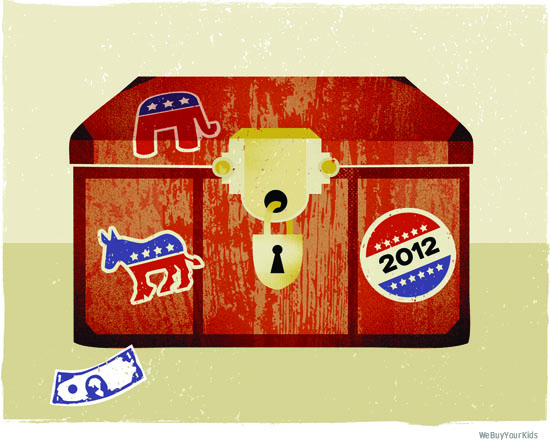
Journalists are big believers in the First Amendment; its legal force undergirds the fearless journalism that democracy requires. But now comes a perversion of that amendment, an effort to turn it against another tool that enables democracy-sustaining journalism: the laws that require political donors to make their names known, and that empower vital reporting on money, power, and influence. Of course, our right to know who funds our politicians or pays for any given civic megaphone has been battered time and again by lawyers and loopholes. Unprecedented amounts of unprecedentedly opaque money will shape the 2012 elections. Reporters already have their work cut out for them to make this understandable and to show who is trying to gain influence and shape public opinion. Imagine how much harder this job would be if disclosure requirements were found to be an unconstitutional burden on free speech?
The First Amendment has already been used to weaken many laws meant to level the playing field and lessen moneyed influence. From the ur-decision of Buckley v. Valeo, which said campaign spending could be constitutionally protected speech, to 2010’s Citizens United decision, which eased corporations’ ability to wage election battles, the three-legged stool of campaign finance reform has been eroded by a twisted interpretation of free expression. Limits on campaign expenditures? Gone. Limits on contributions? Weakened.
What’s left are laws requiring transparency in giving and spending, the one thing everyone used to agree on. It was a common rhetorical point of those who pushed to weaken contribution or expenditure limits: as long as disclosure empowered voters with adequate information, it could factor into their decisions at the ballot box.
You don’t hear that much anymore. Disclosure is now, like the other withered legs of the stool, a target. Take James Bopp, the Indiana lawyer and member of the GOP National Committee who is widely credited as the architect of many recent federal decisions deregulating campaign finance, including Citizens United. In 2010 he told The New York Times that having disclosure laws declared unconstitutional was the next step in a ten-year litigation plan.
Bopp, who often represents Christian conservatives, has adopted gay rights as a proving ground, arguing that opponents of same-sex marriage, who claim they’ve faced retribution for their point of view, deserve to wage their political battles under a cloak. From that flows the idea that campaign-finance disclosure brings the potential to intimidate others who would spend more—possibly much more.
There are precedents that give the anti-disclosure movement hope. In 1982, the Socialist Workers Party successfully argued that public disclosure would endanger its donors. But the courts have been reluctant to expand this narrow exception. A challenge on similar grounds to Washington State’s requirement that signers of an anti-same-sex-marriage ballot petition be made public was dismissed in a 2010 8-1 Supreme Court decision. “[T]o stand up in public for… political acts fosters civic courage, without which democracy is doomed. For my part, I do not look forward to a society which, thanks to the Supreme Court, campaigns anonymously,” wrote Justice Antonin Scalia.
The lower courts have mostly followed this strong signal. But courts change. And Constitutional litigation history shows that losses can lead to victories. For example, a federal judge in West Virginia recently struck down a requirement that funders of print campaign ads be disclosed, saying that the state’s law would “circumscribe the First Amendment rights of its citizens.” An appeal will be heard shortly.
If it stands, and if other cases follow, the First Amendment, whose spirit animates our public sphere, will instead be used to make it a darker arena, with less accountability, transparency, and knowledge. It would be an unwelcome development for journalism—and for democracy.
The Editors are the staffers of the Columbia Journalism Review.
